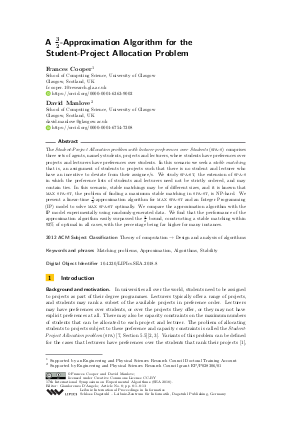A 3/2-Approximation Algorithm for the Student-Project Allocation Problem
Authors
Frances Cooper  ,
David Manlove
,
David Manlove 
-
Part of:
Volume:
17th International Symposium on Experimental Algorithms (SEA 2018)
Part of: Series: Leibniz International Proceedings in Informatics (LIPIcs)
Part of: Conference: International Symposium on Experimental Algorithms (SEA) - License:
 Creative Commons Attribution 3.0 Unported license
Creative Commons Attribution 3.0 Unported license
- Publication Date: 2018-06-19
File

PDF
LIPIcs.SEA.2018.8.pdf
- Filesize: 469 kB
- 13 pages
Document Identifiers
Subject Classification
ACM Subject Classification
- Theory of computation → Design and analysis of algorithms
Keywords
- Matching problems
- Approximation
- Algorithms
- Stability
Metrics
- Access Statistics
-
Total Accesses (updated on a weekly basis)
0Document
0Metadata
Abstract
The Student-Project Allocation problem with lecturer preferences over Students (SPA-S) comprises three sets of agents, namely students, projects and lecturers, where students have preferences over projects and lecturers have preferences over students. In this scenario we seek a stable matching, that is, an assignment of students to projects such that there is no student and lecturer who have an incentive to deviate from their assignee/s. We study SPA-ST, the extension of SPA-S in which the preference lists of students and lecturers need not be strictly ordered, and may contain ties. In this scenario, stable matchings may be of different sizes, and it is known that MAX SPA-ST, the problem of finding a maximum stable matching in SPA-ST, is NP-hard. We present a linear-time 3/2-approximation algorithm for MAX SPA-ST and an Integer Programming (IP) model to solve MAX SPA-ST optimally. We compare the approximation algorithm with the IP model experimentally using randomly-generated data. We find that the performance of the approximation algorithm easily surpassed the 3/2 bound, constructing a stable matching within 92% of optimal in all cases, with the percentage being far higher for many instances.
Cite As Get BibTex
Frances Cooper and David Manlove. A 3/2-Approximation Algorithm for the Student-Project Allocation Problem. In 17th International Symposium on Experimental Algorithms (SEA 2018). Leibniz International Proceedings in Informatics (LIPIcs), Volume 103, pp. 8:1-8:13, Schloss Dagstuhl – Leibniz-Zentrum für Informatik (2018)
https://doi.org/10.4230/LIPIcs.SEA.2018.8
BibTex
@InProceedings{cooper_et_al:LIPIcs.SEA.2018.8,
author = {Cooper, Frances and Manlove, David},
title = {{A 3/2-Approximation Algorithm for the Student-Project Allocation Problem}},
booktitle = {17th International Symposium on Experimental Algorithms (SEA 2018)},
pages = {8:1--8:13},
series = {Leibniz International Proceedings in Informatics (LIPIcs)},
ISBN = {978-3-95977-070-5},
ISSN = {1868-8969},
year = {2018},
volume = {103},
editor = {D'Angelo, Gianlorenzo},
publisher = {Schloss Dagstuhl -- Leibniz-Zentrum f{\"u}r Informatik},
address = {Dagstuhl, Germany},
URL = {https://drops.dagstuhl.de/entities/document/10.4230/LIPIcs.SEA.2018.8},
URN = {urn:nbn:de:0030-drops-89439},
doi = {10.4230/LIPIcs.SEA.2018.8},
annote = {Keywords: Matching problems, Approximation, Algorithms, Stability}
}
Author Details
Funding
- Cooper, Frances: Supported by an Engineering and Physical Sciences Research Council Doctoral Training Account
- Manlove, David: Supported by Engineering and Physical Sciences Research Council grant EP/P028306/01
References
-
D.J. Abraham, R.W. Irving, and D.F. Manlove. Two algorithms for the student-project allocation problem. Journal of Discrete Algorithms, 5:73-90, 2007.

-
R. Calvo-Serrano, G. Guillén-Gosálbez, S. Kohn, and A. Masters. Mathematical programming approach for optimally allocating students' projects to academics in large cohorts. Education for Chemical Engineers, 20:11-21, 2017.

-
M. Chiarandini, R. Fagerberg, and S. Gualandi. Handling preferences in student-project allocation. Annals of Operations Research, to appear, 2018.

- F. Cooper and D. Manlove. A 3/2-approximation algorithm for the Student-Project Allocation problem. Technical Report 1804.02731, Computing Research Repository, Cornell University Library, 2018. Available from URL: http://arxiv.org/abs/1804.02731.
-
Z. Király. Linear time local approximation for maximum stable marriage. Algorithms, 6:471-484, 2013.

-
A. Kwanashie, R.W. Irving, D.F. Manlove, and C.T.S. Sng. Profile-based optimal matchings in the Student-Project Allocation problem. In Proceedings of IWOCA '14: the 25th International Workshop on Combinatorial Algorithms, volume 8986 of Lecture Notes in Computer Science, pages 213-225. Springer, 2015.

-
D.F. Manlove. Algorithmics of Matching Under Preferences. World Scientific, 2013.

-
D.F. Manlove, R.W. Irving, K. Iwama, S. Miyazaki, and Y. Morita. Hard variants of stable marriage. Theoretical Computer Science, 276(1-2):261-279, 2002.

-
D.F. Manlove and G. O'Malley. Student-project allocation with preferences over projects. Journal of Discrete Algorithms, 6:553-560, 2008.

-
A.E. Roth. The evolution of the labor market for medical interns and residents: a case study in game theory. Journal of Political Economy, 92(6):991-1016, 1984.

-
H. Yanagisawa. Approximation Algorithms for Stable Marriage Problems. PhD thesis, Kyoto University, School of Informatics, 2007.

